JIHADIST ACTIVITY VS. MILITARIZED HUMANITARIAN INTERVENTIONS: THE CENTRAL SAHEL CASE STUDY
Resumo
With the withdrawn of French troops from Mali, a militarized decade-long intervention, and the jihadist expansion moving south from Burkina Faso and Mali, the present research aims to understand what this means to the status of the humanitarian activity in the region and which lessons can be derived from the nexus between humanitarian intervention and jihadist intervention in the Central Sahel.
The Economic Community of West African States (ECOWAS) African-led International Support Mission to Mali (AFISMA) will be the intervention in focus to be analyzed in this research, based on the Chapter 8th of the UN Charter. These interventions, along with the case study of the Central Sahel will serve as the starting point to answer the following research questions: (i) Is there a correlation between the presence of militarized humanitarian intervention and the proliferation of jihadist militant NSAG in Central Sahel region (Burkina Faso, Mali and Niger) over the past decade; and (ii) What is the impact of jihadist activity in militarized humanitarian intervention and what is the impact of militarized humanitarian intervention on the jihadist activity in the Central Sahel region (Burkina Faso, Mali and Niger) over the past decade.
In addition, it is necessary to state from the beginning of this research that when referring to humanitarian activity, this study comprises not only the impact that the jihadist activity has to the militarized humanitarian actors and interventions in the regions, but also, in general, humanitarian organizations; since, one of the main roles of the militarized interventions with humanitarian purposes is to protect humanitarian convoys and the security of humanitarian actors. More about the role of the militarized services to securing humanitarian access and security for the humanitarian workers will be discussed in connection to the section on security incidents.
The jihadist militant groups will be often referred to in this research as non-state armed groups (NSAG) as well as only armed groups, considering the theoretical lens of the International Humanitarian Law (IHL), which does not distinguish between NSAG in terms of counterterrorism and counterinsurgency classifications. Other common terms to define these actors are ANSA (armed non-state actors), AGDA (armed groups and de facto authorities), parastatal and paramilitary groups.
As for the military state components officially recognized by the government of a nation, the terms used will be armed forces, intervening military forces, interveners. Despite of the fact that jihadist militant groups can be involved in activities related to private military companies’ services (private military companies, PMCs, or mercenaries), as well as activities characterized by criminal organizations behavior, these specific features will not be utilized to deconstruct NSAG’s definition as it is characterized by IHL.
With the aim of analyzing the relationship between two reality indicators, the proliferation and fragmentation of NSAG in the Central Sahel with the presence of international militarized interveners, the definition of militarized intervention in this case study will consider a series of military and security initiatives including the G5 Sahel Joint Force, the Operation Barkhane, the Takuba Task Force, the Sahel Coalition, the Sahel Alliance, the Security and Stability Partnership in the Sahel, the United Nations Multidimensional Integrated Stabilization Mission in Mali (MINUSMA).


